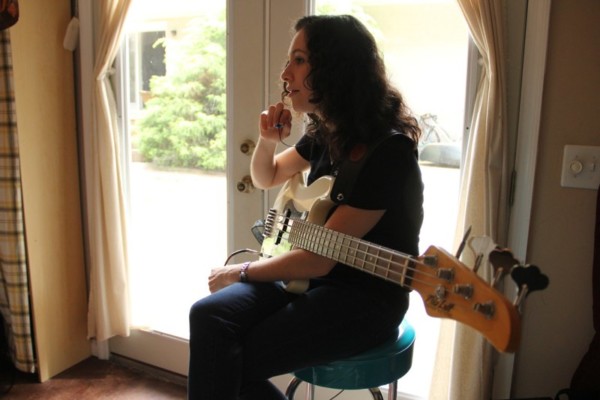Making Music Your Career

Q: I have a job which a) takes up a lot of my time and b) doesn’t pay very well. I’ve been thinking about something you’ve mentioned before about when you quit your job and made your music career your job. Do you have any advice on how to manifest that?
A: I will preface this by saying that it was a somewhat risky move, and it was equal parts liberating and terrifying.
Your life situation will dictate how much of this is feasible, but I’ll tell you how I went about it.
First, some background for those that haven’t heard about that part of my journey. I have spent my life knowing that, no matter what, I was going to be a musician. To that end, I never worried about getting a useful degree (something that would actually get me a better job) or about taking jobs with any kind of long-term career-like planning involved. Every job was disposable so that, if I got lucky and scored a gig or tour, I could drop it on the spot and take that opportunity. I’ve managed a sub shop (while going to college), drove a AAA service truck, drove moving trucks, worked construction, worked at three Pizza Huts in three different states, managed a few different coffee shops, worked temporary manual labor jobs through an agency, worked at a gas station, worked at a liquor store… you get the idea. A million jobs that I could walk away from if a real gig came through.
My biggest issue was that I was often working 35-45 hours a week and making next to nothing for the trouble. About a decade ago (in my early 30’s), I felt like I was trying to walk the wrong way up an escalator. No matter how much I tried, I just couldn’t make anything happen with regard to a career in music. I only had so much time to practice and gig and certainly didn’t have enough time to really put much thought and energy into my approach to my career, making every move a lateral move.
One day (while working at my last job at a coffee shop), I had the realization that I wasn’t prioritizing what I really wanted in my life. Compounded by the fact that I was broke anyway, I quit my job at the end of my shift, came home and announced to my wife that I was done working minimum wage jobs and would now be wholly committed to making a career for myself. I was now going to make my life my job and vice-versa.
Now, this is where having the right partner came into the equation. This would not fly with many otherwise supportive and nurturing women I’ve known. She didn’t have a solid career-type gig either. She couldn’t float us. We had managed to buy a house and had a mortgage. I told her that I’d rather lose the house and live in a crappy apartment again while working my ass off for myself than live in our house working my ass off for someone else. And my wife said, “Well, you’d better get busy then, huh?” That was it. Just make it happen. It wouldn’t be easy but as long as I was investing in myself 100%, she had my back.
The reality of the next few years was that I was broke. Like, broke, broke. But, I was ever more determined and, lo and behold, every year, I made just a little more money than the year before. Every year, I made a new connection or two that led to better gigs and some teaching opportunities. Every year, I got closer to my goal and things got better and better. I’m still not rich, but we’re middle class and holding, which was always my goal in life. Just to make a middle-class living, doing what I love. If I do even better than that, fantastic. But I never cared about getting famous or having a Jag amidst my car collection. I just wanted to pay my bills and still have some money in the bank at the end of the day. Maybe even take a vacation once every few years. I may dream small, but it felt huge to me.)
So back to the how…
My first piece of advice is to think long and hard about how badly you want to make a living as an artist (independent contractor: short-hand for unemployed in between every job). It is hard to manifest, and you can never really hit cruise control. You have to continually push, think long term, re-evaluate new realities and adjust accordingly, practice hard, network hard, gig hard, travel hard (if you’re lucky), and constantly try and manifest new ways to make a buck. Long gone are the dreams of making million doing that one thing. We now have to work to make a buck doing a million things.
Moving on. Don’t forget that this is only after you have really thought about how badly you want it and wether it is even feasible given whatever life circumstances you have going now. You need to have decided that you would be happier being a musician even if you never make any money. You very well may turn around and find that you are pushing 60, living gig to gig in a funky apartment and you have to be ok with that (at least, that’s what I had decided. I’d rather be a broke bass player eating microwaved noodles for dinner than anything else. Once I made that decision it was easy for me to take the leap).
The good thing is that poverty is a fantastic motivator. When I had an electric bill hanging over my head, I never felt like I could sit back and lay on the couch. I had to be working towards… something. When I was flat broke, I worked that much harder to try and gain some forward momentum. When I had a little money coming in, I worked that much harder to foster that and try to grow it. Each step I took made me want to blast through to the next that much harder.
So, what did I actually do?
First, I evaluated my playing and made a list of things that I needed to work on in order to be able to own any musical situation that came my way. I practiced hard. Harmony, reading, playing changes, diving into other styles of music (salsa, Brazilian, middle-eastern rhythms, African rhythms, pop, R&B, gospel, country… You name it, I was checking it out and expanding my vocabulary). I tried to isolate every perceived weakness in my playing and attack it vigorously. If I was chilling on the couch reading, I was reading books about jazz harmony, musician’s autobiographies, etc. I never got into “how to make money fast” type books or self-help books although I know a lot of cats who did and gained perspectives or refined their approaches to making money. Those never jived with me but they do for many. I focused purely on being the best musician I could.
- Then, I got into the networking side of things. I focused on my local scene as well as social media. Locally, I went to jam sessions. I went to other people’s gigs. I paid attention to who was who and what bassists were working in town (I had only been here a short while so I didn’t know many people in the scene). I took lessons from the best players in town; and not just bassists. I took lessons from pianists and guitarists as well. I’d always come armed with a load of questions (usually about jazz harmony) but I would also ask for a critique while we played some tunes (what could I do better? am I doing anything that doesn’t fit the style? etc..). This served a few purposes. Primarily, I got to develop and learn from the best Portland had to offer (which is pretty great). Additionally, it made the players in town aware of me personally and we developed relationships. As I developed, those people started hiring me because I could read, learned how to play changes, and they respected my professional attitude and work ethic.
- Social media – I started recording every gig and musical opportunity, hoping for 30 seconds of magic. I’d post everything worth posting online. I started doing (very bad) youtube videos; sometimes playing, sometimes talking about something I was working through and playing a bit, sometimes trying to give lessons on something… I put it all out there, trying to gain a foothold in the larger musical community online (which wasn’t as common back then. Especially when I was rocking my first MySpace page!) My line of thinking was that, the cream will rise to the top and the better my content got, the better I’d become perceived as ‘one of the guys on the scene’, whether or not I had any real gigs. I was never disingenuous or trying to portray myself as being anything other than what I was but I figured that maybe I could get those gigs by displaying my ability to do them in as many arenas as possible. I put both the cart and the horse out there and I didn’t care which came first, just as long as something came along eventually.
- Treat every opportunity as a real opportunity. I saw a lot of local musicians treating local bar gigs (or even decent gigs) as just as disposable as I treated my pizza making gigs. I was so happy to be working at all, for any money, playing music, that I treated every gig as precious. And it had an impact on the people hiring me. I became known as 100% dependable, reliable and capable. It didn’t take long before I became the first call guy in town for a lot of work because I never cancelled on gigs, I was always early, I was always clean and presentable, I always had what I needed for the gig, I always prepared well and I was easy to work with. I also had the side benefit of being somewhat new and not that busy, so my availability was a plus (initially anyway). That, and I could read very well. There are really only a few electric players in this town who can read at an advanced level, so that work ethic paid off. Many of the busiest players in town started using me as a last minute sub when conflicts arose because I became known as a guy who could read just about anything and sound natural doing it. It didn’t take long for the band leaders to take notice of that as well. Word spreads fast when there’s a new solid player in town.
- So what do you do when not shedding or gigging? Thinking ahead a few years, thinking about the reality I want to manifest and making actual lists and outlines with regard to how I can make that a reality. There is no such thing as down time. For example, while on a van tour in the US, I found myself just sitting in an econoline for HOURS every day on the way to the next gig. I started thinking about how to make my workflow more efficient and foster more teaching opportunities (a nice way to pad the income as it’s hard to do it all with just gigging every night (at least until the gigs start paying real money)).
- This is when I wrote the first version of my first book, Right Hand Drive (initially called the “Erskine Bass Perspective”). I realized that I was going over much of the same material every time I gave a lesson, so I started by writing an outline for a pamphlet I would make available to my students for a few extra bucks. I didn’t have a laptop at the time, so I spent the tour dialing in an outline and thinking about how to go about writing and printing the ‘pamphlet’ (later turned book #1). When I got home, I worked obsessively on writing the pamphlet. I used Word and Encore for the music notation. I printed them at Kinko’s and sold them for a few bucks more than it cost to print them. Nowadays, I use Sibelius and CreateSpace (a great Amazon service) to print and sell the books but the process hasn’t changed much. I spent upwards of 10 hours a day writing and editing, depending on my schedule. Like I said, if I wasn’t shedding or gigging, I was working towards something and that was the key. Always have something that you are working on or towards.
So currently, after about 10 years from the time I quit my coffee shop gig, I’m on the road about 100 days out of the year with three different groups (and still looking to tour more), I teach four different jazz workshops in four different countries every year, I teach at PSU, I teach privately, I contribute to magazines, I record an average of 5-10 albums a year for other artists, I have some passive income from my books, albums, and royalties from the duo-strap that I made for myself and Gruv Gear masterfully converted into a much more functional, and universally useful product. It didn’t take as long as I thought to get the balls rolling and to build momentum.
I keep track of my finances every year. My first year here, I made a little over $7k. Like I said, I was hurting but I didn’t let it dissuade me. Through my determination, I tended to make about $10k more every subsequent year. I’m still a five-figure kind of guy, but I’ve been holding steady at an income that keeps me comfortable in my ability to pay my bills, keep my house, keep my car, buy the food I want to eat, go to the doctor when something is wrong, etc.. I don’t have a huge savings but I’m comfortable and established in my career at this point. All in all, it didn’t take me all that long to move from minimum wage coffee slinger to middle-class musician and it only took me a year or two to make more playing bass than I was making working those crappy jobs. The best part is that I love what I do and, if I’m setting an alarm, it’s because I have to catch a flight to a gig, not because I have to open a coffee shop at 5 am (I will never miss the feeling of getting to bed a 2:30 am after a gig – or later – and waking up at 4:30 to go to work. Jetlag ain’t got a thing over that kind of schedule).
Follow your own path, though. Every city has something different to offer and varying opportunities to foster. Every one of us has different goals and hopes for ourselves and our music. Be open to everything and explore it all. The mantra is forward momentum. As long as you are fostering that, you are moving in the right direction. I very much ran towards the direction of a jack of all trades, freelance bassist but you could very well apply this methodology towards your own band, your own music, etc.. Just decide what you want your reality to look like in the future and invest 100% of yourself towards that end.
Have a question for Damian Erskine? Send it to [email protected]. Check out Damian’s instructional books, Right Hand Drive and The Improviser’s Path.



